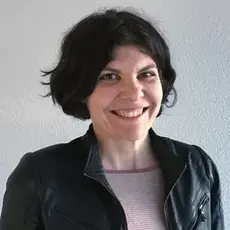Rieter Endowed Professorship for Industrial Artificial Intelligence

"We focus on developing learning-based control and optimization methods that integrate expert knowledge and symbolic relationships to optimize industrial manufacturing processes, enhance autonomy, and ensure safety in the face of complex dynamics and variability."
Dr. Alisa Rupenyan, Rieter Endowed Professorship for Industrial Artificial Intelligence
The Rieter endowed professorship at the Centre for Artificial Intelligence has a particular focus on the development and application of principled, neuro-symbolically inspired learning in conjunction with processes in production and service. This combines machine learning with knowledge-based systems.
Fields of Expertise
- Learning-based control and optimization of manufacturing systems
- Neuro-symbolic AI for modeling and optimization of manufacturing processes
- Expert knowledge integration in machine learning models
Industrial manufacturing processes pose various challenges to their optimization and control, due to their complex dynamics, lack of observability, and large variability. Apart of finding the right optimization approaches and parameters, finding the right strategy to adapt to different requirements, different components of the equipment, or changes in the environment is crucial. Leveraging existing information in the form of graph-based contextual information, logical rules, or another abstracted form of pre-existing knowledge is very promising to alleviate the large variability challenge. The research focus of the Industrial AI (IAI) group is on the development of learning-based control and optimization methodologies, incorporating the existing expert knowledge, and symbolic relationships in the process, tapping into the newly emerging neuro-symbolic AI approaches. Our goal is to demonstrate that industrial processes can be optimized, combining machine learning models (such as neural networks) and symbolic reasoning (graph-based representations, logical rules), and methods from control and sequential decision making, as well as domain expertise. We are interested in achieving increased autonomy for systems in various domains (manufacturing, construction, process industries), and working with distributed systems, while striking a balance between autonomy and human oversight. By developing innovative solutions that leverage both quantitative data and qualitative domain understanding, we contribute to more adaptive, efficient, and safe industrial processes across various domains.
Services
- Insight: keynotes, trainings
- AI consultancy: workshops, expert support, advise, technology assessment
- Research and development: small to large-scale collaborative projects, third party-funded research, student projects, commercially applicable prototypes
Team
Head of Research Group
Projects
-
Cloud-Enabled Learning Controllers for HVAC Application (AIHVAC)
This research project is focused on development of an artificial intelligence-based method for optimizing the control functionality of Belimo's HVAC field devices in order to significantly reduce the energy consumption in buildings.
current, 09/2025 - 10/2027
-
Robotic 3D printing toolkit (R3PT)
This Bridge Discovery project will establish innovative technology for polymer 3D printing extrusion head, including software for process optimization, trajectory optimization, and closed loop control.
current, 06/2025 - 05/2029
-
Continuous optimization and control for advanced manufacturing
In these two collaborative projects funded by NCCR Automation, we aim to develop methods for advancing manufacturing systems' productivity, resilience, and efficiency within the framework of Industry 4.0 by focusing on two topics: / Control and Task Planning for Advanced Manufacturing using expert…
current, 08/2024 - 07/2028
-
Digital Manufacturing as a Service Technology (DMAAST)
Digital Manufacturing as a Service Technology (DMaaST) is designed to improve the manufacturing ecosystem's resilience and adaptive capacity to external events through a Smart Manufacturing Platform structured into four layers: The data layer establishes a foundation for interoperable data exchange…
current, 05/2024 - 05/2028
-
Intelligent planning for robot-based manufacturing
The proposed research seeks to merge data-driven methods, symbolic knowledge, and domain expertise to enhance the planning, optimization, and control of industrial robots and processes in robot-based manufacturing. By incorporating sensor data, we can leverage additional information to monitor and…
current, 08/2023 - 07/2027
Publications
-
2025.
From research to practice in manufacturing.
In:
2025 European Control Conference (ECC).
European Control Conference (ECC), Thessaloniki, Greece, 24-27 June 2025.
IEEE.
pp. 3010.
Available from: https://doi.org/10.23919/ecc65951.2025.11186949
-
Rupenyan, Alisa; Sawicki, Benjamin,
2025.
From research to practice in manufacturing : interactive session I.
In:
2025 European Control Conference (ECC).
European Control Conference (ECC), Thessaloniki, Greece, 24-27 June 2025.
IEEE.
pp. 3013.
Available from: https://doi.org/10.23919/ecc65951.2025.11187228
-
Wu, Mingkun; Rupenyan, Alisa; Corves, Burkhard,
2025.
Singularity-avoidance control of robotic systems with model mismatch and actuator constraints[paper].
In:
2025 European Control Conference (ECC).
European Control Conference (ECC), Thessaloniki, Greece, 24-27 June 2025.
IEEE.
pp. 2545-2550.
Available from: https://doi.org/10.23919/ecc65951.2025.11187077
-
Wu, Mingkun; Rupenyan, Alisa; Corves, Burkhard,
2025.
Robotics and Computer-Integrated Manufacturing.
97(103080).
Available from: https://doi.org/10.1016/j.rcim.2025.103080
-
Wu, Mingkun; Rupenyan, Alisa; Corves, Burkhard,
2025.
Nonlinear Dynamics.
113(16), pp. 21631-21651.
Available from: https://doi.org/10.1007/s11071-025-11299-6








